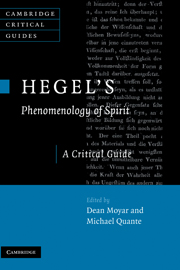Book contents
- Frontmatter
- Contents
- Notes on the contributors
- Preface
- List of abbreviations and citations
- Chapter 1 Substance, subject, system: the justification of science in Hegel's Phenomenology of Spirit
- Chapter 2 “Science of the phenomenology of spirit”: Hegel's program and its implementation
- Chapter 3 The Phenomenology of Spirit as a “transcendentalistic” argument for a monistic ontology
- Chapter 4 Sense-certainty and the “this-such”
- Chapter 5 From desire to recognition: Hegel's account of human sociality
- Chapter 6 “Reason … apprehended irrationally”: Hegel's critique of Observing Reason
- Chapter 7 What is a “shape of spirit”?
- Chapter 8 Ethical life, morality, and the role of spirit in the Phenomenology of Spirit
- Chapter 9 Self-completing alienation: Hegel's argument for transparent conditions of free agency
- Chapter 10 Practical reason and spirit in Hegel's Phenomenology of spirit
- Chapter 11 Religion and demythologization in Hegel's Phenomenology of Spirit
- Chapter 12 The “logic of experience” as “absolute knowledge” in Hegel's Phenomenology of Spirit
- Bibliography
- Index
Chapter 12 - The “logic of experience” as “absolute knowledge” in Hegel's Phenomenology of Spirit
Published online by Cambridge University Press: 22 September 2009
- Frontmatter
- Contents
- Notes on the contributors
- Preface
- List of abbreviations and citations
- Chapter 1 Substance, subject, system: the justification of science in Hegel's Phenomenology of Spirit
- Chapter 2 “Science of the phenomenology of spirit”: Hegel's program and its implementation
- Chapter 3 The Phenomenology of Spirit as a “transcendentalistic” argument for a monistic ontology
- Chapter 4 Sense-certainty and the “this-such”
- Chapter 5 From desire to recognition: Hegel's account of human sociality
- Chapter 6 “Reason … apprehended irrationally”: Hegel's critique of Observing Reason
- Chapter 7 What is a “shape of spirit”?
- Chapter 8 Ethical life, morality, and the role of spirit in the Phenomenology of Spirit
- Chapter 9 Self-completing alienation: Hegel's argument for transparent conditions of free agency
- Chapter 10 Practical reason and spirit in Hegel's Phenomenology of spirit
- Chapter 11 Religion and demythologization in Hegel's Phenomenology of Spirit
- Chapter 12 The “logic of experience” as “absolute knowledge” in Hegel's Phenomenology of Spirit
- Bibliography
- Index
Summary
The problem with Hegel's characterizations of the new philosophical form that he invented, a Phenomenology of Spirit, is simply that there are far too many descriptions. Some are clearly reformulations or specifications of others; but in many other cases the descriptions seem inconsistent, or to reflect different periods in Hegel's rapidly evolving thought between 1802 and 1806 in Jena. The Phenomenology was originally a “Science of the Experience of Consciousness.” He names it “the Science of the Phenomenology of Spirit” and the “Introduction” to the “System of Science.” It was also the first part of such a system. The Encyclopedia calls the Phenomenology “the scientific history of consciousness.” In the body of the work, Hegel calls the work “the way of the soul which journeys through the series of its own configurations as though they were the stations appointed for it by its own nature, so that it may purify itself for the life of the Spirit, and achieve finally, through a completed experience of itself, the awareness of what it really is in itself” (55, ¶77). He famously calls the Phenomenology “the pathway of doubt,” indeed “the way of despair” (56, ¶78), and thereby “the detailed history of the education of consciousness itself to the standpoint of Science” (56, ¶78).
And this is only the beginning.
- Type
- Chapter
- Information
- Hegel's Phenomenology of SpiritA Critical Guide, pp. 210 - 227Publisher: Cambridge University PressPrint publication year: 2008
- 2
- Cited by



